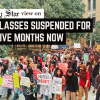Bring paralysed campuses back to life

The continued paralysis at the Khulna University of Engineering and Technology (KUET), which has been effectively closed for over two and a half months now, may be a reflection of the present turbulent time itself, but nothing justifies such disruptions as they leave a profound impact on the future of students. The situation, triggered by clashes over a demand of student politics ban on February 18, provides a troubling example of how unchecked disciplinary violations, administrative inertia, political interference, and an inability to compromise can combine to hold an entire institution hostage. Reportedly, despite the syndicate's decision on Sunday to resume academic activities, the reopening has been stalled due to the reluctance of teachers protesting over assaults and smear campaigns against some faculty members.
KUET teachers have been on strike for five days now. Even though the interim vice-chancellor has been holding repeated meetings and the syndicate is said to have made progress on the teachers' demands, a breakthrough in the stalemate continues to be elusive. Meanwhile, in an apparent repeat of this chaotic mess, Barishal University is heading towards its own shutdown. Over the past week, a group of students have staged protests demanding the VC's resignation—accusing her of "authoritarianism" and unprofessional conduct—with a section of teachers also extending their solidarity. Students have declared that they will suspend academic activities, excluding semester exams, from Monday if their demands are not met.
These are not isolated disruptions. Since the political upheaval of the July uprising, we have seen repeated episodes of campus unrest across the country, where students, divided into various factions, as well as teachers and administrators all clashed over various grievances but effective solutions were rarely achieved. We have also seen such unrest at various colleges and even the polytechnic institutes, where students recently enforced a shutdown over slow progress on their six-point demand. Although the students' platform has decided to temporarily suspend the shutdown programme, allowing classes to resume, exams will remain on hold for now.
This state of affairs in our academic institutions is deeply regrettable. We call on all parties involved to recognise the heavy cost of their uncompromising stances. While some of their demands are genuine, their chosen methods of expression are throwing academic calendars into disarray, delaying exams and graduation, and hurting both current students and future admissions. There is no alternative to proper response from the authorities to address legitimate grievances, but students, and teachers, too have a responsibility here. They must prioritise uninterrupted continuation of academic activities regardless of the issue at hand, while continuing negotiations in parallel. Only through cooperation and compromise can we protect our broader academic interests.


 For all latest news, follow The Daily Star's Google News channel.
For all latest news, follow The Daily Star's Google News channel. 










Comments